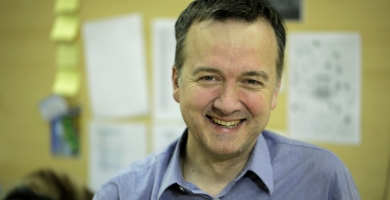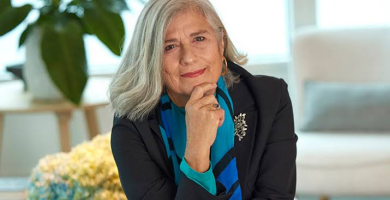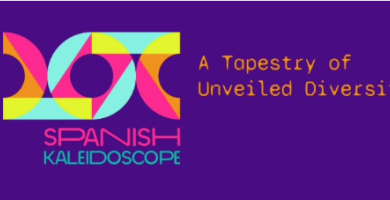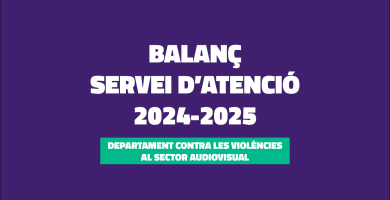
Edmon Roch: “The Film Commission can enable or disable a film production"
Edmon Roch is a film producer, founder of Ikiru Films.

Edmon Roch is a film producer. Through his company Ikiru Films, he has been executive producer of Perfume. Story of a Murderer by Tom Tykwer and he has also produced, written and directed Garbo. El espía, which won the Gaudí Award for Best Documentary and Best Screenplay, the Goya for Best Documentary and the Best Documentary Award at the European Film Festival in Seville.
Roch is co-producer of Biutiful by Alejandro González Iñárritu and he produced Lope by Andrucha Waddington, Las Aventuras de Tadeo Jones of Enrique Gato, among many other films.
During last September he was selected to be one of the 24 producers who participated in the Producers Lab Toronto, an initiative of the Toronto Film Festival. This lab is a program of exchange of ideas, projects and financing information with participants of both sides of the Atlantic. It is a unique opportunity to participate in networking & pitch events, case studies and several roundtables with key members of the film industry.
- In your opinion, what is the role of a producer?
For me, a producer is the person who first "sees" a project. The producer is who has an idea and commissioned it to a writer. Or maybe the producer receives a script by a director and then is responsible for launching it. From there, the producer must be responsible for two essential tasks: financial issues and creative tasks.
The producer is responsible for taking all the elements on board because he or she has to ensure that the film reaches its final destination, which is the public, in the best possible way. The producer has to ensure that the film achieves its goals, not only that the film is financially sustainable but also that the production generates a profit.
- You studied Art History at the university, but you have always worked as a film producer.
Yes, I liked cinema since my childhood, since we went to the cinema with my parents and my brother. So I grew up, and then I realized that not only I liked the films, but also I liked to talk about movies. I began to publish my reviews at the Diari de Girona, with 15 years. But finally I chose Art History because I am also very interested in contemporary art. I was head of the press department at the Sitges Film Festival, I also was a film critic for the Guia del Ocio. When I finished the univeristy, I studied at the London International Film School thanks to a scholarship from La Caixa. Then I already have produced Barcelona by Whit Stillman.
- Until you decided to create your own production company?
Yes, in 2003 I founded Ikiru Films, my own company. Before, I was mainly producing for others or I was the production director of other films. But with Ikiru Films I am able to decide what movie I really want to do. I wanted to contribute with my personal experience and background.
- At the Producers Lab Toronto in which you participated last September, you could share experiences with producers from around the world, such as Canada, Europe, New Zealand and Australia. What experiences did you achieve?
I returned from the Producers Lab with a huge sensation of the diversity of filmmaking. There were a lot of differences among the projects that we presented. For example, Canada, New Zealand, Australia and even our project were mainstream, very commercial and competitive. But there were many projects such as the Slovaks, Bosnians... and other film industries, which were much more authoring, independent… It was a very interesting experience because I noticed the range variety of the different productions, it was really impressive.
- Do you think that the role of the producer in Spain is the same as it is understood in the US or in the English-speaking countries?
The role of the producer is in some ways different. In general a good producer should be able to manage the two tasks I mentioned before, the financial and the creative.
But it is true that, especially in America there is a separation between the studio producer and the independent producer. On the one hand, the figure of an independent producer is more likely to the Spanish one, the tasks to be achieved and the responsibilities to finance the film, the team and the talents are in charge of the producer figuere.
But the studio producer is quite different. This type of producer first presents the project to a studio and then the studio itself is in charge of carrying it out under their control, taking responsibility for funding and other decisions.
- Are there differences when working as a producer in an animated film?
It's very different and yet very similar. The task of the producer to avoid problems before they happen, to anticipate any type of error and to ensure that it all go by their natural path, this is very similar. But for the technique of execution, it has nothing to do because the shooting of a film concentrates between 6 and 12 weeks depending on the magnitude of the project, but an animated film usually takes 3 or 4 years!
- What are the next projects you're working on?
First, with regard to the production line of animated films, we are working on the second part of Tadeo Jones, after the success of the first half. It will be released in 2017.
And secondly, we are working on a documentary that tells the story of the writer Sanmao, who falls in love with a Seville guy and they go to live in the Sahara. It's a kind of story that it’s difficult to believe, but it is completely true! The writer is very well known in China and Taiwan, but even here his works have not been translated.
And we are also working on the upcoming movie of Daniel Monzón, after El Niño. And we are also preparing a project with the young talented Catalan, David Victori.
- As a producer, what do you expect from a Film Commission?
A Film Commission must help me, first of all. I know that they are not going to solve everything, but in some places it is easy to understand the needs of the producer. They act quickly to transfer them to the relevant authorities. Sometimes you're going to shoot in places that you don’t know and the Film Commission is your guide.
The Film Commission authenticates you and shows local procedures, mechanisms ... This could greatly facilitate the task. The Film Commission can enable or disable a film production!
- Which role played the Barcelona Film Commission in shootings such as Barcelona, Perfume or Biutiful?
During the shooting of Perfume we collaborated very closely with the Barcelona Film Commission. We shooted in Barcelona but in the film the action happens in Paris. So, we changed the city and also the time. It was a film of an extreme complexity and it required the maximum involvement of the city.
It was really a good experience, because with the help of the Barcelona Film Commission we had been able to solve several problems together, making a teamwork between different authorities, the crew, the neighbours…
But well, there is no easy shooting. In Barcelona we had to change Barcelona’s image to 20 years ago... In Biutiful we wanted to shoot the whole film in a sequential order, this meant that the action was more extended in time and all the locations always remained "open". We went always hand in hand with the Barcelona Film Commission, because the purpose is the same for all of us: to make the best movie possible.









